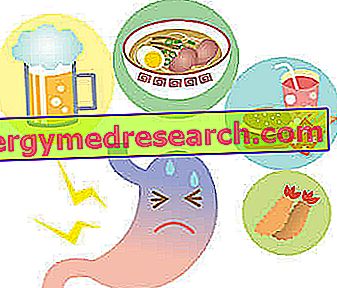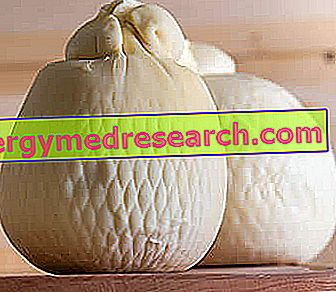Watch the video
X Watch the video on youtubeGenerality
In a context of fat cough, the remedies available to patients are more than one and can be of a pharmacological, natural and homeopathic nature.
Pharmacological remedies include mucolytics and expectorants; natural remedies include phytotherapeutic solutions, fumigations and a targeted diet; finally, among the homeopathic remedies, preparations such as antimonium tartaricum , coccus cacti , ferrum phosphoricum and ipecacuanha deserve a special mention .

Review what fat cough is and what it is used for
Fat cough, wet cough and productive cough are three different ways to describe the same type of cough, characterized by the production and emission of phlegm (the so-called sputum ).
Contrary to common opinion, oily cough is a precious protective reflex, which the organism puts in place to quickly clear the clogged airways of a mucus "plug". For example, in classic respiratory diseases such as colds and flu, the formation of large accumulations of mucus mixed with bacteria and other types of pathogens hinders normal breathing; in such circumstances, the cough reflex - which favors the expulsion of infected mucous secretions - is particularly useful for speeding up the healing time of the underlying disease.
CAUSES OF FAT COUGH
In most cases, the fat cough is due to trivial viral or bacterial infections of the respiratory tract (the cold and the flu mentioned above are the most common examples).
More rarely, fat cough is the result of pathologies or conditions of greater clinical depth, such as, for example, asthma, pneumonia, chronic obstructive pulmonary disease, lung abscess, bronchiectasis and cystic fibrosis.
Remedies
What and what are the remedies for fat cough?
The remedies for greasy cough are all those solutions that allow to speed up the recovery from fat cough and to mitigate the intensity of this particular event, during the healing process.
The list of possible remedies against greasy cough includes drugs, natural therapies ( natural remedies ) and homeopathic therapies ( homeopathic remedies ).
First, however, to move on to the description of the various therapeutic proposals for fat cough, it should be remembered that the latter is not a disease, but rather a symptom, to be precise, a symptom of respiratory diseases such as those mentioned in the introduction. This clarification is essential to understand how the treatment of the underlying disease (causal therapy) is nothing short of essential to resolve the problem of fat cough at the root, much more than the remedies used to directly combat the latter (symptomatic therapy). Therefore, reporting an example to clarify what has just been said, if the cause of the fat cough is an infection of bacterial nature, the patient will have to add, to the remedies described below, a specific antibiotic therapy against the bacterium responsible for the infection (NB : taking antibiotics causes an inevitable weakening of the immune system, which is why, to strengthen the body's natural defenses, it is advisable to take yogurt with live lactic acid bacteria at the same time or supplement the diet with a probiotic).
drugs
In the presence of oily cough, the doctor can advise or prescribe the so-called mucolytic drugs and / or so-called expectorant drugs.
- Mucolytic drugs: known more simply as mucolytics, these drugs are able to favor the fluidization of the mucus and facilitate its elimination, as they act at the level of the proteins constituting the aforementioned mucus, "breaking them".
The mucolytics are indicated when the mucus "plug", glued to the airways, has such a thick and viscous consistency, that the patient finds it difficult to expel it from the mouth with a cough.
- Expectorant drugs: also known as expectorants, these medicines are able to promote the expulsion of the excess mucous secretion, present along the respiratory tract (trachea and bronchi in particular);
Purging of mucosal stasis, induced by expectorants, frees the airways, significantly improving patient well-being.
Some more information about mucolytics
The most commonly used mucolytic drugs are: bromexina (Bisolvon Linctus), acetylcysteine (Fluimucil) and erdosteine (Erdotin).
Mucolytic drugs are contraindicated in children under the age of 2 years, since, specifically in these subjects, the risk of bronchial obstruction significantly increases.
What drugs to avoid?
Although fat cough is often an actually bothersome and irritating condition (both for the patient and for those around him), in his presence it is good NOT to take antitussive drugs (or cough suppressants ). In such circumstances, in fact, these medicines - which are widely used for the control of dry cough - would hinder the physiological and natural removal of bacteria trapped in the mucus, lengthening healing times or, even worse, encouraging the proliferation of pathogens.
Among the most contraindicated antitussives, for the reasons given above, those of a narcotic nature, such as codeine and dextromethorphan, are certainly included.
Natural remedies
Natural remedies for fat cough are good alternatives to mucolytic and expectorant drugs. In fact, if targeted, they still make it possible to restrict healing times with satisfactory results, especially when the basic condition (ie the cause of the fat cough) is of limited clinical thickness.
Among the natural remedies most used for the treatment of fat cough, are:
- Herbal remedies (ie remedies obtained from plants or plant extracts). Syrups and herbal teas are probably the most appreciated herbal medicine solution;
- The so-called suffumigi ;
- Food-grade interventions .
Phytotherapy: the natural active ingredients most indicated against fat cough
The most useful active ingredients to counteract the fat cough can come from the following plants:
- Plants with an expectorant action, such as eucalyptus, licorice, grindelia, basil, saffron, coltsfoot and anise. They have the ability to prevent and eliminate the accumulation of phlegm in the airways.
- Fluidifying plants, such as horehound and licorice. They promote the elimination of mucous secretions, causing a reduction in their viscosity.
- Mucilaginous plants, such as marshmallow, mallow, horehound, coltsfoot, flax and linden, and emollient plants, such as chamomile. They are indicated in the presence of a persistent fatty cough which inflames the mucous membranes of the throat.
- Immunostimulant plants, such as echinacea, astragalus, eleuterococcus and uncaria. They have the effect of strengthening the immune system.
fumigations
Also known as fumenti, the fumigations induce the fluidization of the mucus in a completely natural way; in this action they are surprisingly effective, especially if enriched with essential oils with expectorant properties.
Food interventions: what are the best foods for fat cough?
In the presence of fat cough, nutrition is more important than is commonly believed.
In such circumstances, in fact, the patient's intake of large quantities of liquids (from 8 to 10 glasses of water per day) and the consumption of hot foods such as soups, broths and milk are particularly beneficial (better if sweetened with the honey), as these have the effect of softening the inflamed mucous membranes of the throat and favoring the fluidization of the mucus.
Fruits and vegetables are also useful, especially those with a high content of antioxidants, vitamins and mineral salts.
The use of fruit and vegetables is particularly indicated when episodes of fat cough depend on flu states.
Homeopathic remedies
According to professionals in the field, homeopathy can be of benefit to those suffering from fat cough and can not resort to herbal remedies (therefore, homeopathy as an alternative to herbal remedies).
There are various homeopathic remedies for fat cough; the choice of the homeopathic remedy to use depends on the type of fat cough or, better, on the symptoms that accompany the fat cough. For example:
- Antimonium tartaricum : it is indicated in the presence of fat cough, accompanied by malodorous and difficult to expel mucus;
- Coccus cacti : it is indicated in the presence of fat cough with thick phlegm, possibly accompanied by episodes of vomiting;
- Ferrum phosphoricum : it is indicated in the presence of painful and / or itchy fatty cough, possibly associated with hemoptysis (emission of blood from the mouth);
- Ipecacuanha : it is used in the presence of fat cough associated with retching and difficulty breathing.
It is important to remember that the patient must always adhere scrupulously to the indications provided by the homeopath and to avoid self-therapy in the most absolute way.
It is also recalled that homeopathy is not a practice accepted by official medicine, having repeatedly failed the experimental tests conducted with scientific method to demonstrate the hypothetical health benefits.
Advice and prevention
Premise: since respiratory infections are the most common cause of fat cough, this brief incision on some useful advice and on prevention specifically refers to fat cough of bacterial or viral origin.
The most powerful and effective remedy for fat cough is to practice the right prevention against respiratory infections. In practical terms, this means:
- Avoid any possible contagion situation, such as crowded places and contact with infected people;
- Wear clothing that is suitable for outdoor temperatures. For example, during the coldest months it is a good idea to cover yourself properly with a scarf, hat and coat before going outside; avoid, even if briefly, to expose oneself to the cold of winter not properly covered; etc.
In addition, doctors and experts recommend:
- Keep the home and work environment at the right humidity (40-60%), through the use of humidifiers, particularly during the cold months. It is very important for the prevention of fat cough, more than is believed.
- Strengthen the immune system, through a diet rich in antioxidant foods, fruits, vegetables, probiotics and live lactic acid bacteria. It represents another effective preventive measure and a real cure for the organism.
- Avoid swallowing phlegm, as such behavior favors the permanence and proliferation of bacteria along the respiratory tract.
Although they may seem obvious, these rules - which could be defined as sanitary - are essential to protect the body from infectious agents capable of causing fatty cough.
When to call for help?
Fat cough is an extremely common and recurrent phenomenon in both sexes and in all age groups, from newborns to the elderly.
However, it is always a good practice to pay attention to the signs and symptoms that accompany fatty cough, so as to distinguish a form of "common" productive cough from a wet cough of "significant clinical depth".
The following list shows the characteristic symptoms behind which it is possible to hide a dangerous disorder:
- Presence of blood in the sputum;
- Presence of fat cough accompanied by high fever and difficulty breathing;
- Onset of fat cough only at night;
- Presence of fat cough accompanied by tinnitus (ringing in the ears), headache, rash or weight loss for no apparent reason;
- Occurrence of fat cough in the presence of medical conditions, such as hypertension, asthma, heart disease or glaucoma;
- Presence of fat cough for more than three days (persistent fat cough.).



